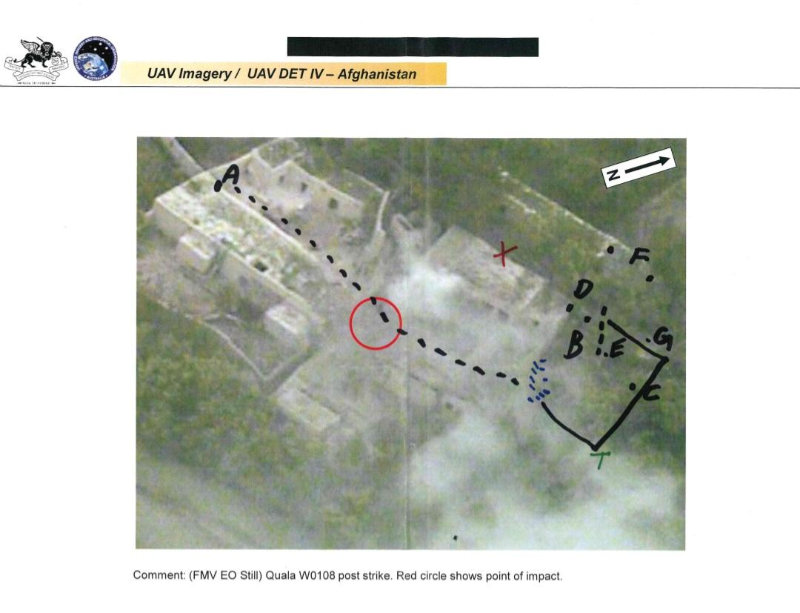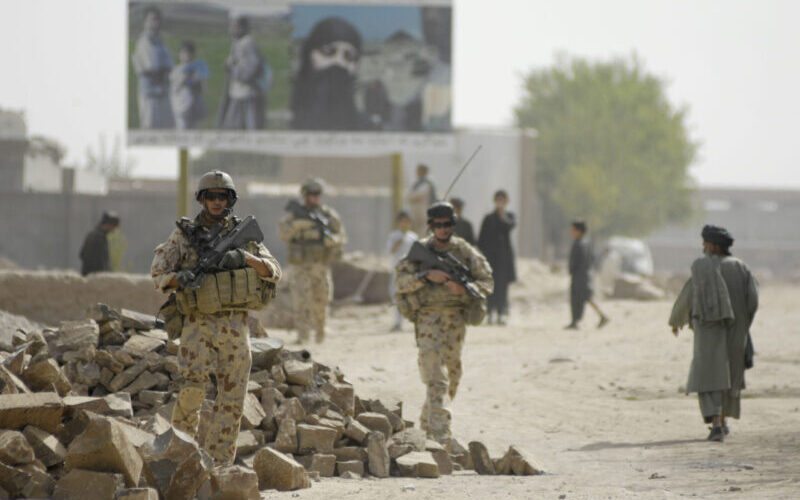Senior Defence officials “buried” an investigation into a major national security breach from the Brereton war crimes inquiry while pursuing whistleblower David McBride for the same crime. Stuart McCarthy with the story.
* Update on May 28 AM: McBride’s appeal failed.
David McBride will know today if his appeal against his conviction for leaking classified material to ABC’s ‘Afghan Files story in 2020 will be successful, or if he has to continue to serve time for blowing the whistle on war crimes in Afghanistan.
We now know that McBride wasn’t the only one. During the war crimes inquiry, dozens of highly classified documents compromising Australian special forces operations in Afghanistan were leaked to Fairfax Media, but no disciplinary action was taken against the senior officers responsible for the leaks.
One of the officials involved in the investigation played a key role in planning the Rudd government’s expanded military commitment to Afghanistan ahead of the Obama administration’s 2009 troop surge at the height of the war.
MWM’s two-year investigation into Afghanistan command cover-ups revealed that a top-secret US spy plane flew a surveillance mission over Darwan village in 2012, where former SAS Corporal Ben Roberts-Smith allegedly directed the execution of elderly local man Ali Jan.
Who knew? High-level Afghanistan war crimes cover-up exposed
Passage of this and other classified imagery through the Australian command chain is considered key to any investigation into higher command responsibility on the part of Australia’s top generals, a matter that was referred to the International Criminal Court (ICC) by Tasmanian Senator Jacqui Lambie two years ago.
Under the ICC’s Rome Statute, commanders can be investigated as potential war criminals in circumstances where they knew or should have known crimes were occurring but failed to take action to prevent further crimes.
Defence Minister Richard Marles’ refusals to initiate criminal proceedings under Australian war crimes laws provided the legal trigger for Lambie’s referral.
Marles last year suppressed the final report of the Afghanistan Inquiry Independent Oversight Panel, which criticised Brereton’s exoneration of senior Australian commanders, for six months until the day McBride was sentenced to more than five years’ jail.
Richard Marles concealed war crimes report, denying justice for David McBride
Greens Spokesperson on defence and justice Senator David Shoebridge says, “We know from the independent oversight review that there was evidence linking Defence leadership to these war crimes when you looked. It’s impossible to believe that evidence wasn’t also available to Brereton.”
Classified images leaked
MWM can now reveal that dozens of highly classified images of various alleged war crime scenes taken by Royal Australian Air Force (RAAF) ‘Heron’ surveillance drones were leaked from the Brereton Inquiry to the media via the office of the Vice Chief of the Defence Force (VCDF) from as early as 2017.
Among the documents leaked to Fairfax were still images from full motion video (FMV) footage of the “Whiskey 108” compound in Kakarak village north of the Uruzgan provincial capital Tarin Kowt.
One of the most serious allegations made by Fairfax, recently upheld by the Federal Court, was that Roberts-Smith machine-gunned a disabled, elderly man after his patrol cleared the ‘Whiskey 108’ compound on 12 April 2009.
Some of the documents leaked to Fairfax were subsequently declassified and displayed as respondent exhibits in the Federal Court during the high-profile defamation proceedings with Ben Roberts-Smith.
The full extent of the classified leaks from the VCDF’s office remains unclear, but the documents obtained by Fairfax from the Defence Secret Network (DSN) include numerous still images from RAAF drone FMV footage, stills from other surveillance platforms, photos of weapons caches, SAS patrol reports, SAS operational messages, Special Operations Task Group (SOTG) operational summaries and printouts of the operations chatroom during two kill-capture missions against high-value Taliban targets.

Classified RAAF UAV imagery of the W-108 compound at Kakarak village, Afghanistan, leaked from the Defence Secret Network to Fairfax.
The images have featured prominently in Fairfax and other media coverage of Roberts-Smith’s alleged war crimes at Kakarak in 2009 and subsequently at Darwan village in 2012.
Complaints about leaks
MWM can also reveal that at least three written complaints about the leaks from the VCDF’s office were made to Defence security officials from late 2017 to early 2018. Two of the complainants were senior Defence civilians, while a third was a senior Australian Defence Force (ADF) special forces officer. The unlawful disclosure of classified information is one of the criminal offences for which McBride was sentenced to more than five years’ jail last year.
Defence sources have informed MWM that the complaints led to an investigation headed by Celia Perkins, who was the head of the Defence Security and Vetting Service (DS&VS) at the time. Perkins’ high profile career included a posting to the Australian Embassy in Washington DC as a defence policy advisor from 2007 to 2010, a period that saw the Rudd government substantially increase Australia’s troop commitment to Afghanistan in 2009 ahead of the Obama administration’s “surge” of 30,000 extra troops to defeat the Taliban insurgency at the height of the war.
Prime Minister Kevin Rudd had privately agitated US President Barak Obama for an expanded international troop commitment to Afghanistan, suggesting ($) to US politicians in 2008 that French and German troops deployed to NATO’s International Security Assistance Force (ISAF) in Afghanistan were “organising folk-dancing festivals,” while the US, Canada, UK, Australia and the Dutch were “doing the hard stuff.” His commitment of an additional 450 Australian troops to Afghanistan in April 2009 preceded Obama’s “surge” announcement by nine months.
In 2010, Rudd’s cabinet colleague, Defence Minister Stephen Smith, personally approved the expansion of the SOTG’s role to include “out of province” raids in support of the US Drug Enforcement Administration’s drug war in Helmand province and elsewhere.
How Defence chiefs committed Australian special forces to the US drug war in Afghanistan
Perkins later served in the Office of National Assessments and as the head of Defence Strategic Policy, before assuming her current post as Deputy Secretary of Security and Estate. She did not respond to MWM’s query on the outcomes of the Defence’s investigation into the 2017-18 classified Brereton leaks.
Investigation buried
Defence sources now say the investigation was “buried” without explanation, somewhere in the bowels of the national security bureaucracy, despite the severity of the security breach. Similar leaks on the deployment of the secretive SAS 4 Squadron to East Africa in 2012, and Rudd’s proposed SAS commitment to NATO’s ousting of the Gaddafi regime in Libya, led to the outsourcing of much of the SAS regiment’s signals intelligence and related capabilities to Omni Executive.
A Defence counter-intelligence official who was briefed on the classified document leaks from the VCDF’s office in 2017-18 told MWM:
“We had received three statements from Defence employees, two civilian, one uniform, about potential deliberate leaks coming from ADF HQ … with a view as to whether it was an issue-motivated individual or some other undisclosed event. Curiously, the statements all implied the leaks were from the office of the VCDF.”
The VCDF at the time of the security breach was Vice Admiral Ray Griggs, who had previously served as Defence’s Deputy Chief of Joint Operations in 2010-11, placing him in the Australian operational command chain during the period covered by the Brereton report.
After his retirement from the military, Griggs replaced former Army Reserve Major General Kathryn Campbell (of later Robodebt infamy) as head of the Department of Social Services.
MWM does not allege any wrongdoing on the part of Griggs, and we have not been able to reach him for comment.
MWM can also reveal that months before the alleged war crimes involving Roberts-Smith at Sola and Darwan in August-September 2012, a RAAF intelligence, surveillance and reconnaissance (ISR) specialist complained to a senior ADF commander in Afghanistan about the SAS patrol commander directing RAAF surveillance drones to the periphery of SOTG ground operations during the extraction phase, to avoid scrutiny of potential misconduct.
The officer ignored the complaint and allegedly chastised the complainant. MWM will not name the senior ADF commander for legal reasons.
One of Brereton’s controversial findings was that Australian commanders “did not have a sufficient degree of command and control” to attract criminal command responsibility for any of the 39 war crimes he identified in his report. Another finding was that there were “impediments” to SOTG squadron or company commanders using ISR platforms to detect misconduct, but he made
no mention of commanders’ control of ISR assets or their use of the resulting footage.
The ABC raid
Almost two years after Defence was alerted to the classified document leaks from the VCDF’s office, the department’s pursuit of the Afghan Files leaks by McBride led to an Australian Federal Police (AFP) raid at the ABC’s headquarters in Sydney.
The ABC’s coverage of the SOTG’s involvement in the controversial kill-capture campaign authorised via a “Joint Prioritised Effects List” (JPEL) target list approved by senior commanders, including Australian officers, goes as far back as the Four Corners ‘In Their Sights‘ documentary in September 2011. The program aired during General Angus Campbell’s tenure as commander of Australian forces in Afghanistan and the Middle East in 2011-12.
In October 2023, Senator Shoebridge asked Campbell, then Chief of the Defence Force, in Senate Estimates if he recalled being made aware of any war crimes allegations during this period. Campbell replied, “I don’t have an awareness now, 12 years later.”
Head of Defence Campbell said he does not remember responding to reports of war crimes when he was in charge of Joint Task Force 633 in 2011/12. pic.twitter.com/r7wxHYwr6s
— David Shoebridge (@DavidShoebridge) October 26, 2023
On Campbell’s retirement from the defence force last year, he was appointed as Australia’s Ambassador to NATO, Belgium and the European Union by the Albanese government. Shoebridge has been consistently scathing in his criticisms of Defence leadership and the government’s failures to protect whistleblowers: “Whistleblowers play an essential role in accountability, especially in matters of national security,
where the cult of secrecy in Canberra is so often used to protect failed leadership rather than the public interest.
Shoebridge says David McBride “is now in jail simply because he spoke the truth and blew the whistle on the culpability of Defence leadership.” The former military lawyer leaked documents to the ABC in an effort to expose wrongdoing by senior Defence officials in their handling of war crimes allegations, after his formal complaints through internal Defence channels and the AFP were ignored.
Pursuing the corporal, not the generals
This saga also raises serious questions about the legacy media’s unquestioning reliance on leaks and backgrounding from senior government officials. McBride initially contacted a Fairfax journalist without success, but was later contacted by ABC reporter Dan Oakes, who haphazardly covered the documents in the Afghan Files without the rigour or impact needed to meet McBride’s intent of holding Defence’s top generals to account.
Oakes admitted to Four Corners last year, “I rang David and I said, ‘Look I know the story you wanted told … I’ve decided that’s not the story.’”
While Fairfax and Nine have vigorously pursued junior-ranked SAS soldiers, including Roberts-Smith, over alleged war crimes, they have conspicuously avoided covering the question of the ADF leadership’s criminal command liability for the same killings. Under international law, command responsibility for war crimes is as serious as the crimes of murder allegedly committed by the junior SAS soldiers, a point still lost on Oakes and the rest of the legacy media.
Nine’s 60 Minutes program was one of the main platforms for the ADF generals’ long-debunked “we didn’t know” narrative around the Brereton report’s publication in 2020.
They didn’t know, really? Pursue top brass over alleged war crimes in Afghanistan, says veteran
By perpetuating this narrative and avoiding the command responsibility issue, what’s now clear is that Nine and the ABC have actively collaborated with a clique of senior officials who should themselves be under investigation for war crimes.
McBride’s concerns once again seem to have been vindicated, yet he’s the one in jail.
Stuart McCarthy is a medically retired Australian Army officer whose 28-year military career included deployments to Afghanistan, Iraq, Africa, Indonesia and Papua New Guinea. Stuart is an advocate for veterans with brain injury, disabilities, drug trial subjects and abuse survivors. Twitter: @StuartMcCarthy_

